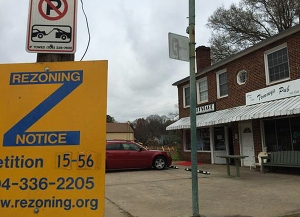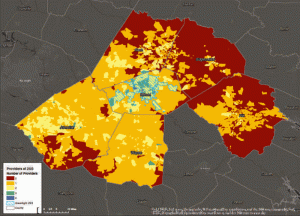
Google Fiber, coming to Charlotte soon, taken March 20, 2015, at the Best Minds conference at Queens University. Photo by Scott E. Lundgren, @scottelundgren
People from Pew Research, Google Fiber, and the Charlotte community met on a Friday night at Queens University in Charlotte to talk about the digital divide and the potential transformation from Google Fiber.
I heard some of the talk because Scott Lundgren streamed it on Meerkat. I could listen in because I have broadband access at home.
Not everyone in Charlotte does. The city has pockets where broadband penetration is only 40%.
One tiny mention during the Q&A after the formal presentations at Queens intrigued me – the idea of a “digital dividend.” Migration to digital tools can save money for businesses and government, and that dividend could be used to help bridge the digital divide.
Try applying that idea to a longstanding digital issue affecting N.C. businesses and governments – required public notices that historically have run in selected newspapers. Local governments want to stop spending the money to advertise public notices in newspapers and simply post the notices on their own sites. Newspapers and the N.C. Press Association propose a compromise this year, in which governments get a 15% discount for repeat advertising and the notices get posted online for free. They rightly argue that most newspaper sites generate more traffic than government websites. They also have at least one lobbyist in Raleigh as well as their own editorial pages to share the benefits of their compromise.
But they’re not the only sites delivering information. Choosing who gets the government contract for advertising public notes can be a political game, and in some small towns, that contract has had the power to kill small news organizations and feed the growth of others. It falls into the “picking winners and losers” category of state and local government law.
So let’s return to that concept of a digital dividend. What if the money currently going to public notice advertising in print was considered a potential digital dividend designated specifically for helping bridge the digital divide?
Use that money to make the notices more accessible to everyone. (And yes, that means everyone, regardless of political leanings, association membership, or ability to fund lobbyists in Raleigh.)
That money could go to one or more of these things:
- local library support for computers, wi-fi, broadband and community outreach so people can access information online.
- internal local government work to make the public notices more useful, granular, searchable by topic, and available to all through something like a simple RSS feed. (The state of Utah does this, with a site run by the state archives. I bet others do too.) As they stand now, the notices are unstructured text blobs, unsearchable on a granular level, like for company names, specific addresses, or type of notice.
- nonprofits specifically working on bridging the digital divide, like Pangaea in Polk and Rutherford counties, which is a 501(c)3 building out broadband. It has received Facebook grants to help broaden digital access in its rural area.
- outreach work to lawyers and others who also must post certain kinds of notices but do so behind paywalls. Convene some meetings to discuss how to open that information to all.
- a fund for unconnected communities in Charlotte and Raleigh, to help pay the $300 initial fee for Google Fiber.
- the local government’s general fund, to help keep property taxes from rising (yes, this bullet point acknowledges political realities. It also helps longtime property owners on small fixed incomes as well as the big property owners. It doesn’t directly help the many newcomers and millennials who are renting, and it does nothing to help bridge the divide.)
Admittedly, the public-notice advertising money isn’t huge compared to the millions that the N.C. General Assembly manages. A 2009 survey by the N.C. League of Municipalities mentioned price tags of $10,500 for Monroe and $42,000 for Charlotte. But it adds up. A 2011 poll by the Associated Press came up with an estimate that local governments in North Carolina alone spent about $6 million in 2010 on legal ads and public notices.
And admittedly, any solution is complicated by differing media circumstances in each N.C. town. If you want to reach people in Davidson or Cornelius, Davidson News or Cornelius News are good bets, but a local paper in Fayetteville might have bigger reach today than a Fayetteville blogger. RSS feeds that reach any site are the best future-proofed solution to that problem.
This issue has been cussed and discussed in Raleigh and in local governments for at least four years now. It’s a bit arcane, not sexy, so proposed solutions generally reflect what Raleigh lobbyists or a few informed legislators want. But the Queens University discussion stemming from Google Fiber’s arrival raised the idea of a digital dividend. Let’s start thinking how that could work for something concrete like government’s public notices.







